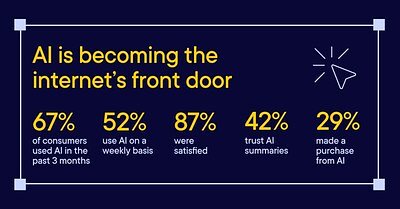
AI Skills Gap Threatens Marketers as Consumers Embrace Generative Tools
New research reveals a widening gap between marketer awareness of AI and their readiness to leverage it, as consumers increasingly rely on generative tools for purchase decisions. Is your brand prepared?
AI Skills Gap Threatens Marketers as Consumers Embrace Generative Tools
By Stephanie Kelly
As consumers increasingly turn to AI-powered tools like ChatGPT and Google AI Overviews for product research and purchase decisions, a growing chasm is emerging between marketer awareness of this shift and their actual preparedness to capitalize on it. New research indicates that while a significant majority of marketers recognize the transformative impact of generative AI, a far smaller percentage feel equipped to effectively integrate it into their strategies.
According to recent findings, 62% of marketers acknowledge the paradigm shift occurring in consumer behavior, yet only 27% believe their organizations are ready to meet the challenge. This disconnect is particularly concerning given that 67% of consumers are already using AI tools to inform their purchasing decisions, and nearly one-third have made purchases based solely on AI-generated responses. Even more alarming, 66% of marketing leaders indicate they would leave their company within a year if it doesn’t develop a robust AI/Generative Experience Orchestration (GEO) strategy.
The Rise of the AI-Powered Consumer
The shift isn't merely about technological advancement; it's a fundamental change in how consumers interact with brands. Historically, marketers have focused on optimizing for search engine rankings to drive traffic to their websites. Now, however, a growing number of consumers are bypassing traditional search altogether, opting instead to ask AI assistants direct questions about products and services. This creates a critical need for brands to ensure their information is accurately represented in AI summaries and responses.
“The traditional funnel is being disrupted,” explains one industry analyst. “Consumers are no longer passively receiving marketing messages; they’re actively seeking information from AI assistants. Brands need to adapt by providing accurate, concise, and compelling information that AI can readily access and share.”
This evolution presents both challenges and opportunities. On the one hand, brands that fail to adapt risk becoming invisible to a growing segment of the population. On the other hand, those that can successfully leverage AI have the potential to build stronger relationships with consumers, personalize experiences, and drive significant revenue growth.
Skills Gap and the Need for Reskilling
The primary obstacle preventing marketers from fully embracing AI is a significant skills gap. Many marketing teams lack the expertise to effectively implement AI-powered tools, interpret data, and develop compelling content for AI assistants. This requires a commitment to reskilling and upskilling existing employees, as well as potentially hiring new talent with expertise in AI, machine learning, and data science.
“It’s not enough to simply understand the concept of AI,” says another industry expert. “Marketers need to be able to use AI tools to automate tasks, personalize experiences, and analyze data. They also need to be able to critically evaluate the information generated by AI and ensure it aligns with their brand values and messaging.”
The need for reskilling isn’t limited to technical skills. Marketers also need to develop new creative skills to craft compelling content for AI assistants. This requires a shift in mindset from creating long-form content to crafting concise, informative responses that can be easily understood by AI.
DXP Vendors Respond – and the Ethical Concerns
Recognizing the growing importance of AI, Digital Experience Platform (DXP) vendors are rapidly integrating AI capabilities into their offerings. Companies like Adobe, Acquia, and SAP Emarsys are focusing on features such as AI-powered personalization, content creation, and data analysis. They are also developing tools to help marketers optimize their content for AI assistants and ensure their brand is accurately represented in AI summaries.
However, the rapid integration of AI also raises ethical concerns. Experts warn about the potential for AI to perpetuate biases, generate misleading information, and compromise consumer privacy. They emphasize the need for transparency, accountability, and ethical guidelines in the development and deployment of AI-powered marketing tools.
“It’s crucial to ensure that AI is used responsibly and ethically,” warns one technology ethicist. “Brands need to be transparent about how they are using AI and protect consumer data. They also need to be mindful of potential biases and ensure that AI is not used to discriminate against certain groups.”
Consumer Expectations and the Future of Marketing
Consumers are increasingly expecting personalized, seamless experiences across all touchpoints. They want brands to understand their needs, anticipate their desires, and deliver relevant content at the right time. AI-powered marketing tools can help brands meet these expectations by automating tasks, personalizing experiences, and delivering relevant content at scale.
However, the human element remains critical. Consumers still value authentic connections with brands and expect personalized service from knowledgeable representatives. AI should be used to augment human capabilities, not replace them.
The future of marketing will be characterized by a seamless integration of AI and human intelligence. Brands that can successfully leverage both will be best positioned to thrive in the evolving digital landscape. Those who fail to adapt risk becoming irrelevant in a world where consumers are increasingly empowered by AI.
“The winners in this new era will be those who can embrace AI while remaining true to their brand values and focusing on building authentic relationships with consumers,” concludes a marketing strategist. “It’s not about replacing humans with machines; it’s about empowering humans with the tools they need to deliver exceptional experiences.”
Key Takeaways:
- A significant gap exists between marketer awareness of AI and preparedness to leverage it.
- Consumers are increasingly using AI tools for product research and purchase decisions.
- Skills gaps and ethical concerns pose challenges for AI adoption.
- The future of marketing will be characterized by a seamless integration of AI and human intelligence.
- Brands that can embrace both will be best positioned to thrive in the evolving digital landscape.
